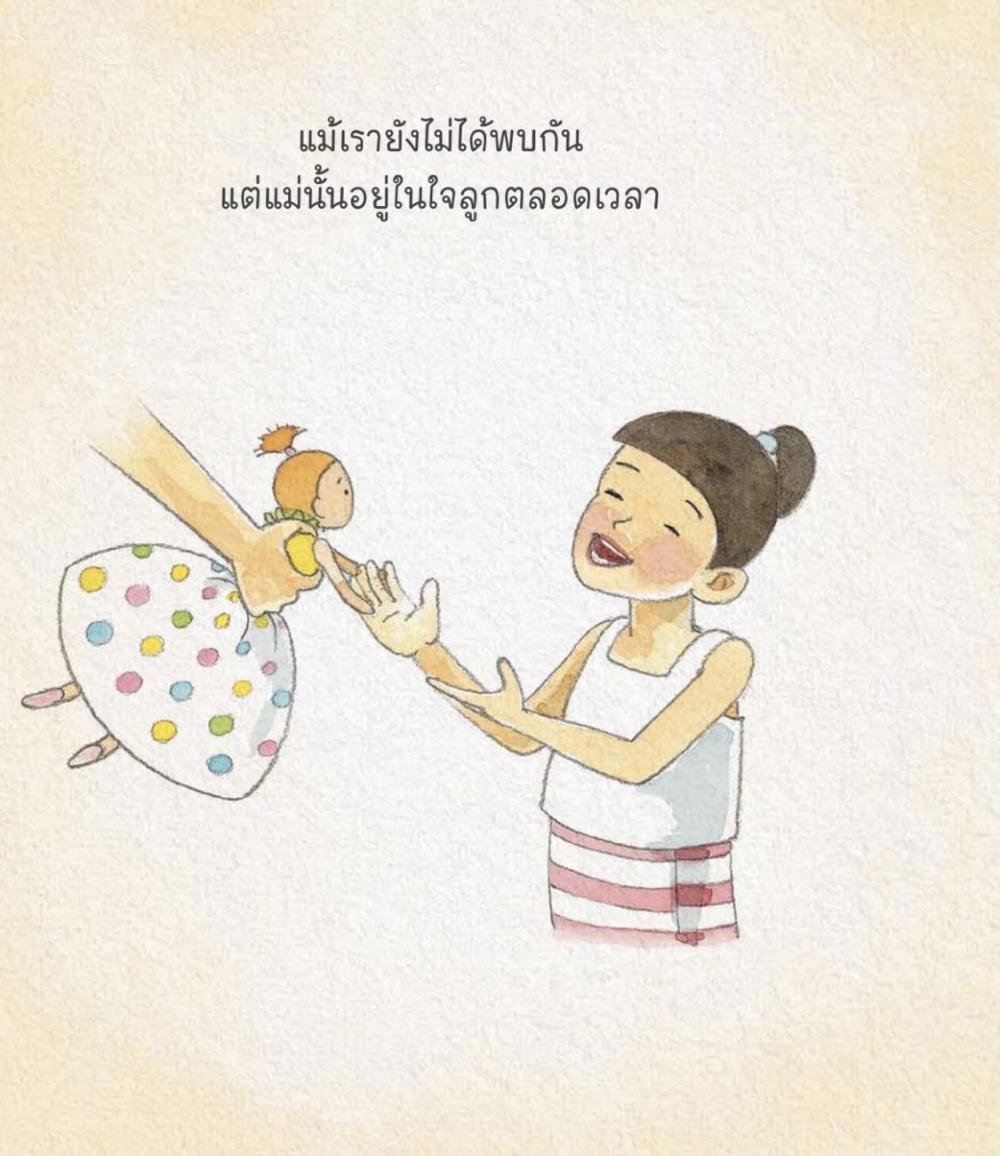A little girl looks at an ambulance which comes to take her mother to the hospital. Sadly, the mother, who has Covid-19, does not return home. During her time of sadness, the little girl has a doll, which her mother gave her, to keep her company. As time goes by, the girl gradually gets over her loss, but she feels that her mother is always a part of her life.
This is a story in children's book Tukta Khong Look (A Daughter's Doll) by Preeda Punyachand, published as a part of a project by the Thai Health Promotion Foundation and the Creative for Reading Cultural Promotion Foundation. The project, "Moral Support For Children During Early Childhood", introduced A Daughter's Doll to help children in their early years cope with the loss of parents or relatives due to the Covid-19 pandemic. The book is available for free download at happyreading.in.th.
According to figures from the Department of Disease Control under the Ministry of Public Health, Thailand's death toll since the pandemic began in 2020 is almost 22,000. The loss experienced by children during the pandemic can affect them throughout their lives.

"Death is not a common experience for children. Some children do not understand what death is. Some suffer greatly and have insomnia after they experience the death of a family member. Characters in books are children's friends. If children read a book and experience the death of a character in the book, they will understand a little more about loss and death," said Preeda.
Dr Prani Paveenchana, a child and adolescent psychiatrist at Manarom Hospital who also runs a Facebook page Mor Maew Nam Lao Ruang (facebook.com/sealpsychiatrist), explained that children at different ages understand death and loss differently. Dr Prani divides children into four groups -- toddlers (three and under), preschoolers (three to six years old), primary schoolers (six to 11) and adolescents (11 and up) -- according to the theory of cognitive development by Swiss psychologist Jean Piaget.
Dr Prani said that although toddlers do not understand the concept of death, they acknowledge that their surroundings have changed and the deceased person has disappeared from their lives. Both toddlers and preschoolers do not understand that death is permanent. Although they feel that their surroundings become different, they cannot express their feelings through verbal language. Caregivers must carefully observe a child's behaviour in order to catch nonverbal cues.

A Daughter's Doll by Preeda Punyachand. Preeda Punyachand
"Toddler and preschoolers react to their losses in many ways. If they are really close to the deceased, they may feel angry, sad, guilty or think that they have been abandoned or rejected. At this age level, children have limited verbal expression, so they may express their feelings through their behaviour. They may have regressive behaviours such as bed wetting, thumb sucking or nail biting. Some go through social withdrawal or become aggressive," Dr Prani explained.
Dr Prani suggested that caregivers should encourage children to express themselves through playing with stuffed toys or role-playing.
"Caregivers should assist children by role-playing with them and explain that the deceased will never return because they are dead. Children may feel insecure and worry about their own safety as well as the safety of other family members. They are afraid that other family members may disappear like the deceased. Thus, caregivers must assure children that they will be taken care of just as before. If their lives do change, caregivers must explain to children the kind of changes that will take place and how caregivers can help them get through difficulties, so children can feel secure," Dr Prani said.

Dr Prani Paveenchana.
The psychiatrist defined the concept of death with four words -- permanent, irreversible, inevitable and universal -- and children at age 10 and older can understand this concept. For primary schoolers between six and 11, some of them cannot understand that death is permanent. Primary schoolers often still believe in magic and fantasy, so they may think the deceased will return to them. Some of them may feel guilty and think that their misbehaviour caused the death of the deceased. Losing a family member can cause primary schoolers to have separation anxiety, so caregivers must explain about death honestly and clearly.
"Caregivers should use the word death. Don't tell children that the deceased has gone somewhere because this will make the children wait for the deceased to return. Caregivers should tell children that the deceased will never return. Don't use words like pass away or sleep because this may cause them to be afraid of sleeping," advised Dr Prani. She pointed out that relatives of those who died from Covid-19 are more emotional because the deceased must be separated and cremated immediately. Relatives do not have an opportunity to properly grieve.
"Caregivers can encourage children to write a letter or draw a picture for the deceased in order to say farewell. Children can also have things such as a photo, a stuffed toy or a tree to keep as a memory of the deceased. Caregivers should explain that although children cannot have any physical contact with the deceased, the deceased can still remain in the children's mind. This kind of grief process can help children to let things go," Dr Prani said.
If a child's behaviour is different than usual, Dr Prani recommended caregivers take the child to see a psychiatrist or psychologist.

"If a bright and lively child becomes socially withdrawn or has regressive behaviour, they should see a psychiatrist or psychologist. To meet an expert does not mean a child has a mental disorder, but an expert can give the caregiver advice about how to assist a child through the grief process," Dr Prani said.
Children's books are one of several tools that can help children to get through their difficulties.
"Reading a book with a caregiver is a way that children can share their feelings. When there is grief, loss or guilt, children must have an outlet to release these emotions. If they feel sad, caregivers must tell them that they can cry. If they are sad or angry, they can punch their pillows or tear used paper," Dr Prani said.
Preeda, who has published almost 200 children's books, said he rarely writes books with negative plots. He created A Daughter's Doll because colleagues asked him to write a book to encourage children who had lost family members to move on.
"Although a character dies, a children's book will never include any violent graphics or scenes. A symbol will be used. In A Daughter's Doll, an ambulance is a symbol of leaving this world," said Preeda.
Dr Prani added that children's books must be classified according to age. Authors should use simple language for preschoolers and add more details for primary school-aged children. Preeda believes the adult reader should not ask questions of the child while a story is being read because it will interrupt their imagination. He also believes that illustrations and stories will communicate with children. However, Dr Prani suggests that while reading to children, the adult should ask the child their opinion.

An ambulance symbolises leaving this world. Preeda Punyachand
"A children's book is a tool to communicate with children since they cannot verbally express how they feel. While reading a book, children may relate to a character and tell the adult they feel similar to the character," Dr Prani said.
Thai society does not talk about death openly, especially with children. Both the psychiatrist and the author agree that Thai people should speak up more about this taboo issue.
"I hope Thai people will openly talk more about death. Children definitely have feelings after the loss of a family member. If they are not allowed to express themselves, they may become depressed and have many questions in their minds that can cause a problem in the future," said Dr Prani.
"Parents should purchase children's books about death for children. Do not block children from learning about death. Books are their world. If they become familiar with this uncommon event, they will understand it better or question their parents about it. That will be a good opportunity for parents to talk to children about death," said Preeda.

Author Preeda Punyachand.
